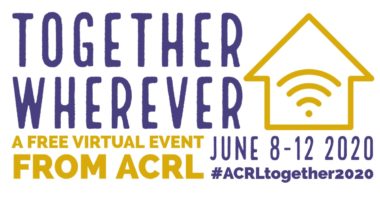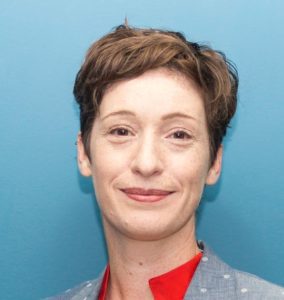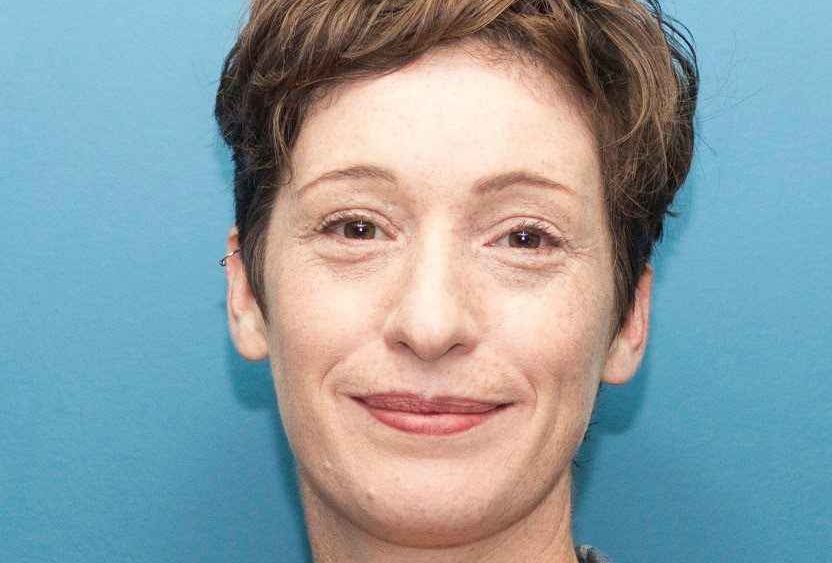 With so many changes going on in universities and colleges across the country, it is becoming difficult to keep up. Professional development learning and activities have been held remotely due to the pandemic. The Association of College and Research Libraries (ACRL) is hosting an upcoming free virtual event called Together Wherever (June 8–12) that will offer opportunities for all library workers to learn a variety of topics, such as “Supporting Diversity in Campus Communities with Drag Queen Story Hour,” “Forgotten Hispano-American Literature: Representation of Hispano-American Presses in Academic Libraries,” and more.
With so many changes going on in universities and colleges across the country, it is becoming difficult to keep up. Professional development learning and activities have been held remotely due to the pandemic. The Association of College and Research Libraries (ACRL) is hosting an upcoming free virtual event called Together Wherever (June 8–12) that will offer opportunities for all library workers to learn a variety of topics, such as “Supporting Diversity in Campus Communities with Drag Queen Story Hour,” “Forgotten Hispano-American Literature: Representation of Hispano-American Presses in Academic Libraries,” and more.
Certainly the pandemic will continue to affect how we work and interact with our communities. In this interview, we speak with Karen Munro, ACRL president, on her thoughts regarding the pandemic and academic librarianship.
Ray: Thanks for taking the time to speak with us! As ACRL president, what is one highlight from your presidency that you would like to share?
Karen: Our focus on EDI has been very rewarding for me throughout my term on the Board. We know that academic librarianship as a profession is largely white, and that hasn’t changed despite decades of well-intentioned work around diversity. I can’t say that we’ve fixed this yet, but I was grateful to be part of what feels like a genuine and meaningful change in how ACRL is addressing the issues. I’ve participated in important culture change conversations with the Board, and have seen members take action within committees, task forces, sections, and other groups across the association.
For my own small part, I’ve been proud to help change our appointment process so that we now ask opt-in demographic questions when we share our call for volunteers. This will help us to benchmark and know better who is volunteering, who is getting appointed, and where we can do better at being an inclusive, diverse, and equitable organization. I know we have a long way to go, but I feel hopeful that we’ll get there.
Ray: With the pandemic occurring, what are your thoughts on collection strategy across multiple and independent universities?
Karen: I think our willingness to collaborate and help each other is more important than ever, whether it’s about raising awareness for OER at consortial levels, advocating for more transparent licensing agreements to increase our combined leverage with publishers, or negotiating with publishers and vendors for better affordability overall. The OhioLink consortium, which negotiated reduced textbook costs for students at multiple universities, is just one great example of what’s possible.
The pandemic has also challenged us to think in new ways about how we collect and how our collections are accessed—I’m thinking of the National Emergency Library, where we need to think about how to fairly compensate creators when we bring new eyes to copyright law and access policies. Again, I don’t think I have the big fix, but I’m very hopeful that we’ll continue to see a rise in creativity and “why not…what if?” thinking to our collection strategies.
Ray: I am curious about your thoughts on our field: what do you see changing in academic librarianship after the pandemic is over?
Karen: I think we’ll continue to see advocacy on behalf of library workers around work expectations and work conditions. For librarians, this might focus around vocational awe (thanks to Fobazi Ettarh for this concept) and the need to see our careers within the context of our whole lives. For other library workers, especially front-line workers, this might be about health and safety practices. I’m hopeful that the value of the library may be seen more clearly and comprehensively on campuses where faculty are taking advantage of more remote support and digital resources.
I’m also hopeful that our institutions will see a near future of strong enrollments, meaning that there will be resources and support for academic libraries and library workers in the coming years. In all of this, I think we need to stay focused on enacting and communicating our values and our value—what we care about, what we do well, and the tremendous benefits we bring to our institutions.
 Karen Munro is the 2019–2020 ACRL president and the associate dean for learning and research services at Simon Fraser University in Burnaby, BC, Canada. Munro’s service to ACRL includes serving as chair of the ACRL Sections Council (2008–2009) and as co-chair of the ACRL Conference Planning Green Component Committee (2007–2009).
Karen Munro is the 2019–2020 ACRL president and the associate dean for learning and research services at Simon Fraser University in Burnaby, BC, Canada. Munro’s service to ACRL includes serving as chair of the ACRL Sections Council (2008–2009) and as co-chair of the ACRL Conference Planning Green Component Committee (2007–2009).



